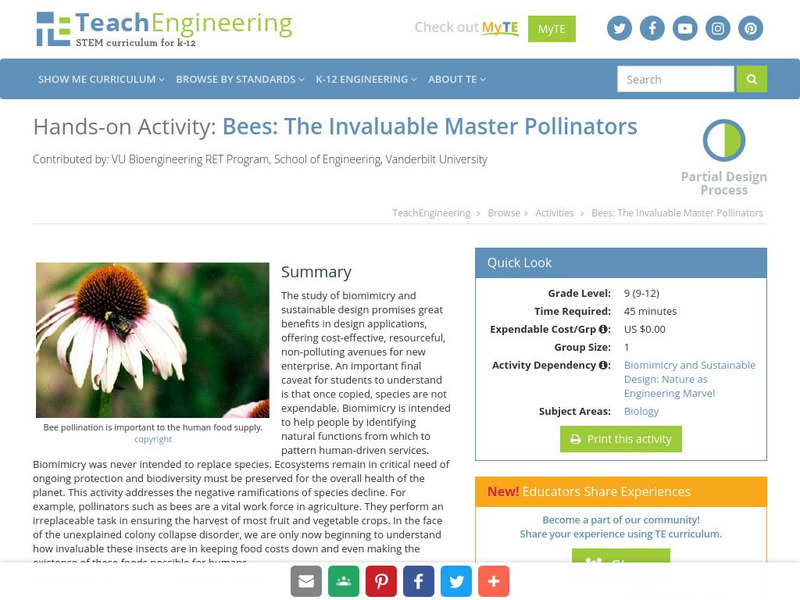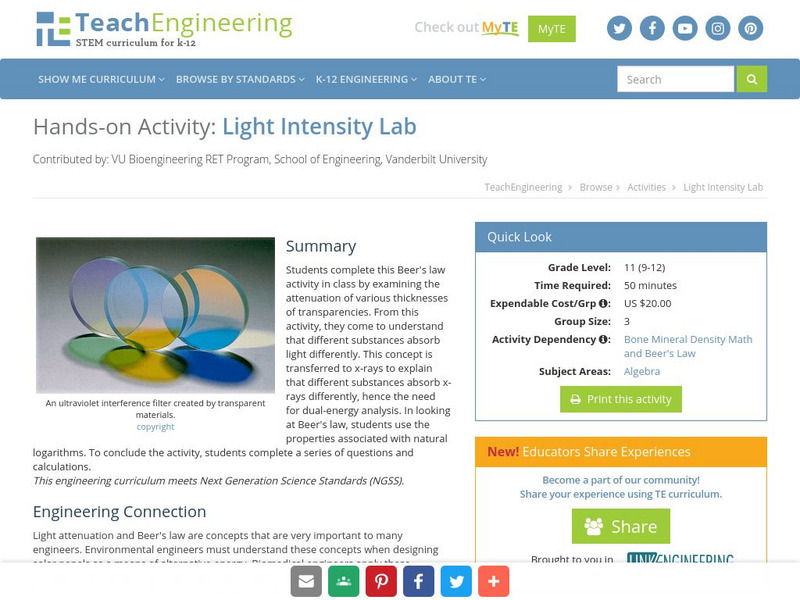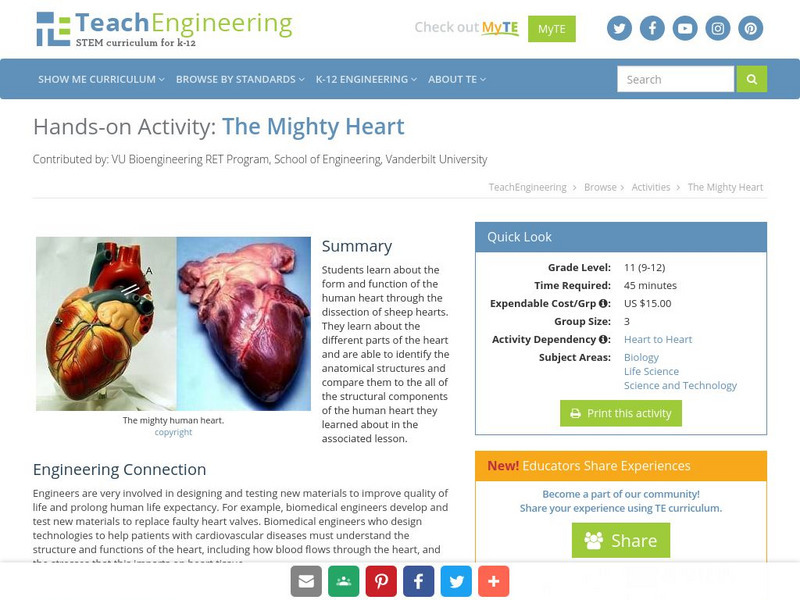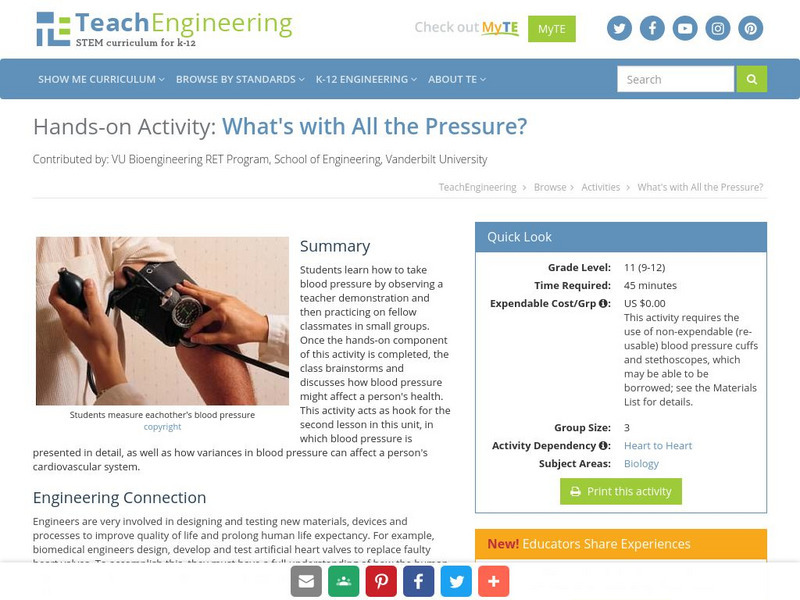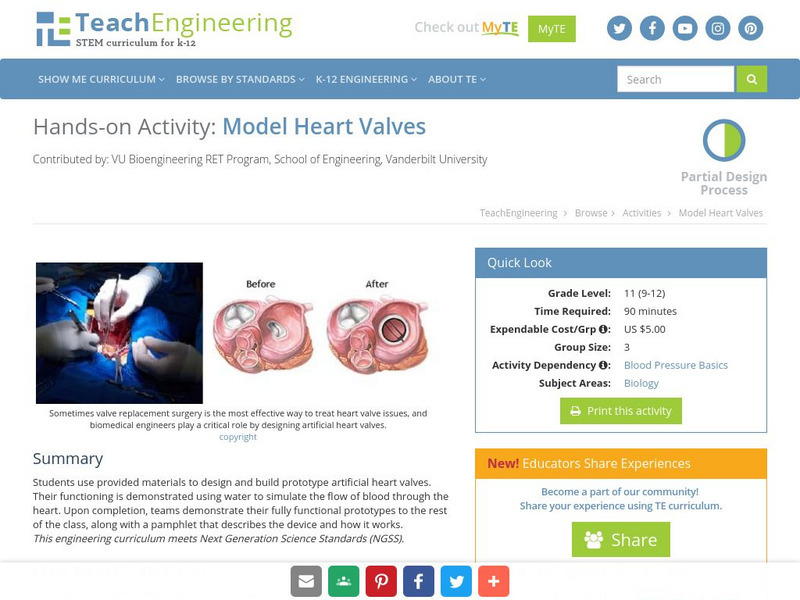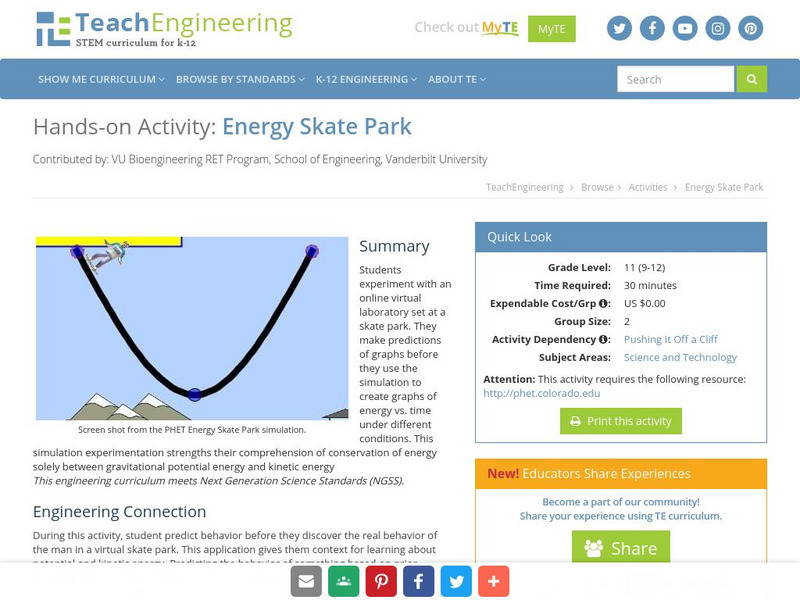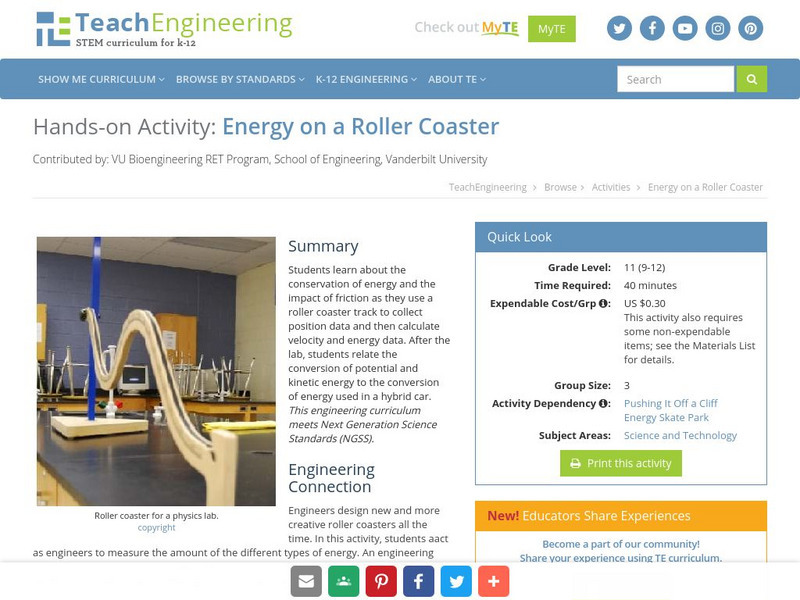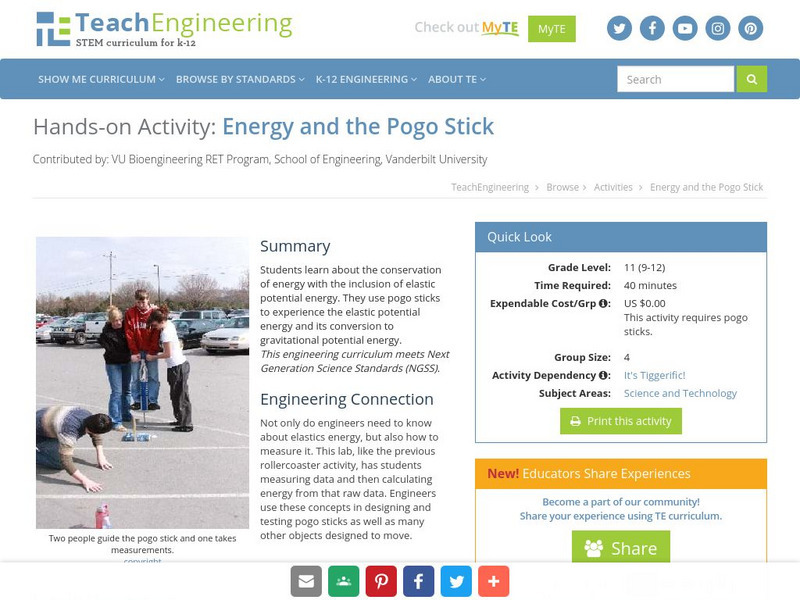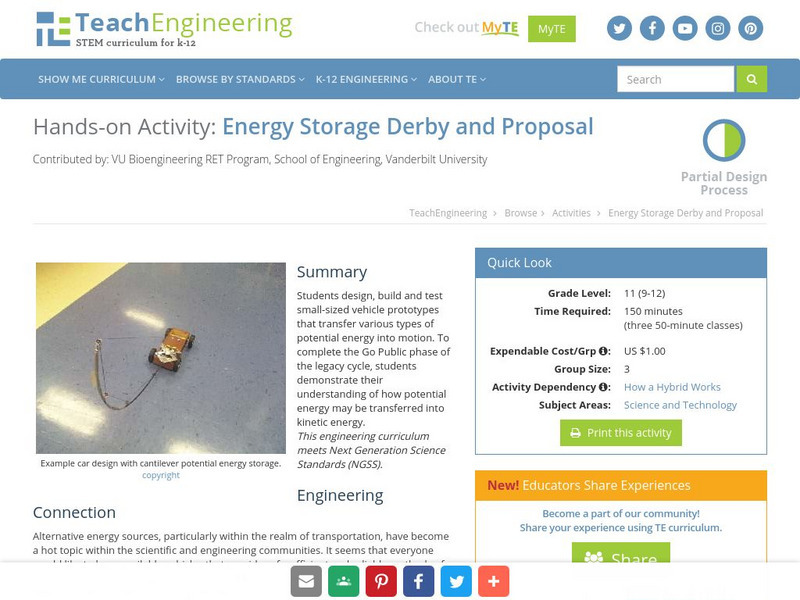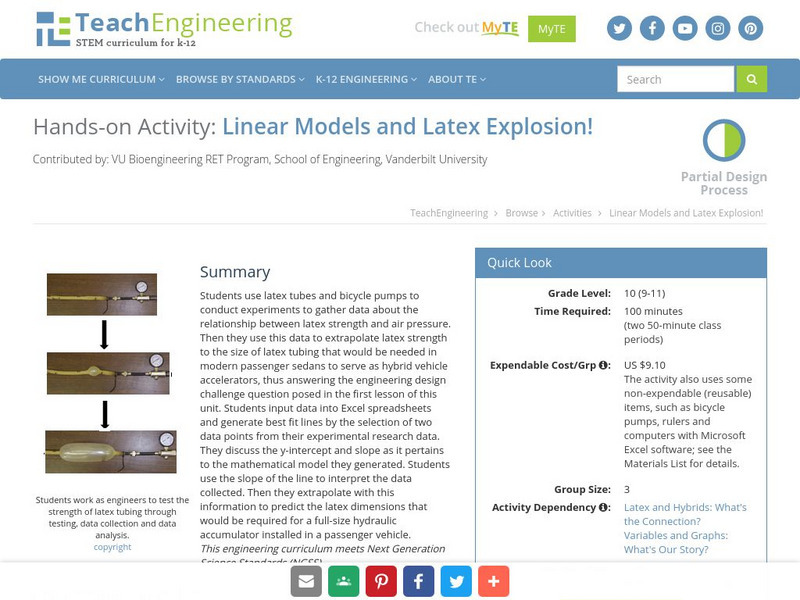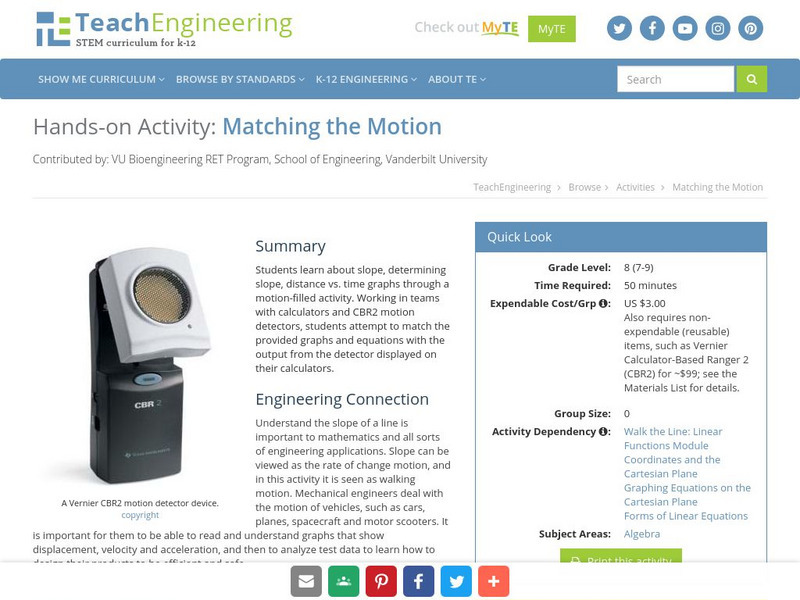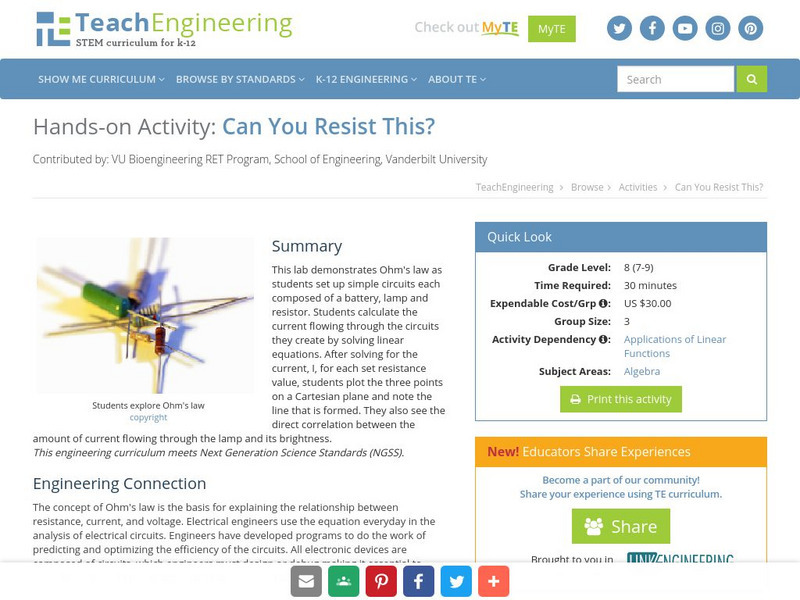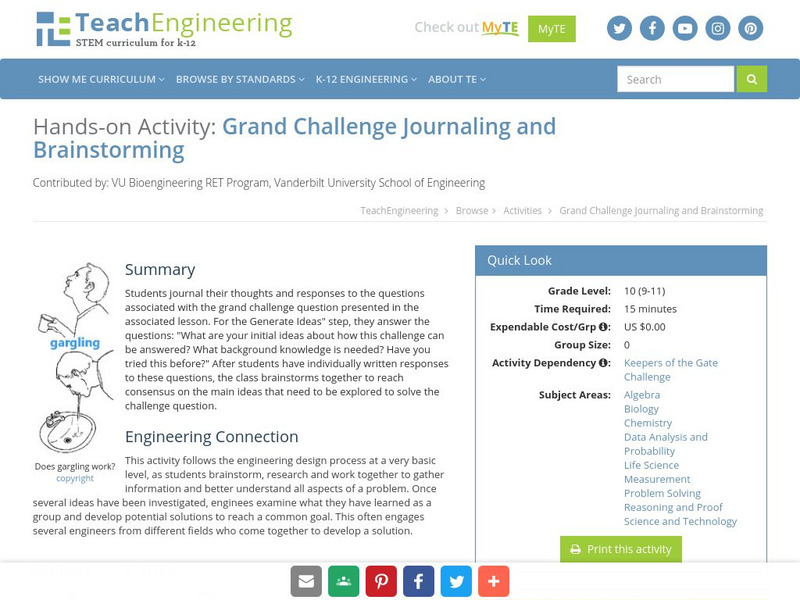TeachEngineering
Teach Engineering: Bees Are Master Pollinators
The study of biomimicry and sustainable design promises great benefits in design application. It affords means by which to promote cost-effective, resourceful, non-polluting avenues for new enterprise. These "blueprints" have existed...
TeachEngineering
Teach Engineering: Exploring Bone Mineral Density
In this activity, students will explore two given websites to gather information on Bone Mineral Density and how it is measured. They will also learn about X-rays in general, how they work and their different uses, along with other...
TeachEngineering
Teach Engineering: Linear Regression of Bmd Scanners
Students complete an exercise showing logarithmic relationships and examine how to find the linear regression of data that does not seem linear upon initial examination. They relate number of BMD scanners to time.
TeachEngineering
Teach Engineering: Light Intensity Lab
Students complete this Beer's Law activity in class. Students examine the attenuation of various thicknesses of transparencies. From this activity, students will understand that different substances absorb light differently. This can...
TeachEngineering
Teach Engineering: Applying Hooke's Law to Cancer Detection
Students explore Hooke's law while working in small groups at their lab benches. They collect displacement data for springs with unknown spring constants, k, by adding various masses of known weight. After exploring Hooke's law and...
TeachEngineering
Teach Engineering: You Be the Radiologist!
In addition to the associated lesson, this activity functions as a summative assessment for the Using Stress and Strain to Detect Cancer unit. In this activity, students will create a 1-D strain plot in Microsoft Excel depicting the...
TeachEngineering
Teach Engineering: Magnetic or Not?
Students explore the basic magnetic properties of different substances, particularly aluminum and steel. There is a common misconception that magnets attract all metals, largely due to the ubiquity of steel in metal products. The...
TeachEngineering
Teach Engineering: Drawing Magnetic Fields
Students use a compass and a permanent magnet to trace the magnetic field lines produced by the magnet. By positioning the compass in enough spots around the magnet, the overall magnet field will be evident from the collection of arrows...
TeachEngineering
Teach Engineering: Circuits and Magnetic Fields
In this activity, students use the same method as in the activity from lesson 2 to explore the magnetism due to electric current instead of a permanent magnet. Students use a compass and circuit to trace the magnetic field lines induced...
TeachEngineering
Teach Engineering: Pill Dissolving Demo
In a class demonstration, the teacher places different pill types ("chalk" pill, gel pill, and gel tablet) into separate glass beakers of vinegar, representing human stomach acid. After 20-30 minutes, the pills dissolve. Students observe...
TeachEngineering
Teach Engineering: The Mighty Heart
Students learn about the form and function of the human heart through the dissection of sheep hearts. They learn about the different parts of the heart and are able to identify the anatomical structures and compare them to the all of the...
TeachEngineering
Teach Engineering: What's With All the Pressure?
Students learn how to take blood pressure by observing a teacher demonstration and then practicing on fellow classmates in small groups. Once the hands-on component of this activity is completed, the class brainstorms and discusses how...
TeachEngineering
Teach Engineering: Model Heart Valves
Students use provided materials to design and build prototype artificial heart valves. Their functioning is demonstrated using water to simulate the flow of blood through the heart. Upon completion, teams demonstrate their fully...
TeachEngineering
Teach Engineering: Energy Skate Park
This activity focuses on the conservation of energy solely between gravitational potential energy and kinetic energy. Students work with a virtual laboratory set at a skate park. They make predictions of graphs before they use the...
TeachEngineering
Teach Engineering: Energy on a Roller Coaster
This activity utilizes hands-on learning with the conservation of energy and the interaction of friction. Students use a roller coaster track and collect position data. The students then calculate velocity, and energy data. After the...
TeachEngineering
Teach Engineering: Energy and the Pogo Stick
This activity utilizes hands on learning with the conservation of energy with the inclusion of elastic potential energy. Students use pogo sticks to experience the elastic potential energy and its conversion to gravitational potential...
TeachEngineering
Teach Engineering: Energy Storage Derby and Proposal
In Activity 5, as part of the Going Public step, students demonstrate their knowledge of how potential energy may be transferred into kinetic energy. Students design, build and test vehicle prototypes that transfer various types of...
TeachEngineering
Teach Engineering: Linear Models and Latex Explosion!
Students use latex tubes and bicycle pumps to conduct experiments to gather data about the relationship between latex strength and air pressure.
TeachEngineering
Teach Engineering: Club Function
Students explore the definition of a function by playing an interactive game called "Club Function." The goal of the game is to be in the club! With students each assigned to be either a zebra or a rhinoceros, they group themselves...
TeachEngineering
Teach Engineering: Matching the Motion
Students learn about slope, determining slope, distance vs. time graphs through a motion-filled activity. Working in teams with calculators and CBL motion detectors, students attempt to match the provided graphs and equations with the...
TeachEngineering
Teach Engineering: Can You Resist This?
This lab demonstrates Ohm's law as students set up simple circuits each composed of a battery, lamp and resistor. Students calculate the current flowing through the circuits they create by solving linear equations. After solving for the...
TeachEngineering
Teach Engineering: Keepers of the Gate Journal and Brainstorm
Students journal their thoughts and responses to the questions associated with the grand challenge question presented in the associated lesson. For the Generate Ideas" step, they answer the questions: "What are your initial ideas about...
TeachEngineering
Teach Engineering: Cell Membrane Color Sheet and Build a Cell Membrane
Students color-code a schematic of a cell and its cell membrane structures. Then they complete the "Build-a-Membrane" activity found at http://learn.genetics.utah.edu. This reinforces their understanding of the structure and function of...
TeachEngineering
Teach Engineering: Active and Passive Transport: Red Rover Send Particles Over
Students compare and contrast passive and active transport by playing a game to model this phenomenon. Movement through cell membranes is also modeled, as well as the structure and movement typical of the fluid mosaic model of the cell...


